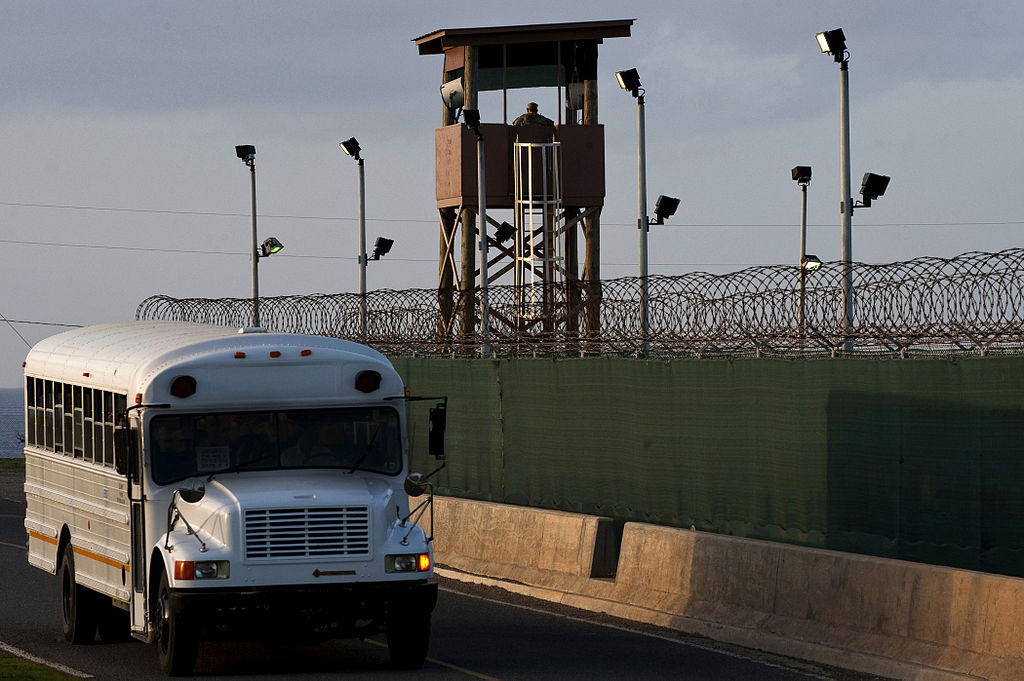Last Week at the Military Commissions: Al-Iraqi Back in Motion
The military commission trying alleged al-Qaeda commander Abd al-Hadi al-Iraqi reconvened in public session on April 17 after a break in proceedings since February.

Published by The Lawfare Institute
in Cooperation With

The military commission trying alleged al-Qaeda commander Abd al-Hadi al-Iraqi reconvened in public session on April 17 after a break in proceedings since February. During this session, the commission discussed several defense motions including motions to abate the proceedings and to compel the production of discovery, maintenance of an MRI capability, and government adjudication of documents marked “pending classification review.” Below is a summary of these proceedings.
Procedural Matters
Military judge Col. Peter Rubin called the commission to order on April 17. All parties present during the previous session returned, with the exception of Navy Capt. Jeff Fischer for the defense, whose absence the commission had authorized in advance. New members also joined each team: Navy Lt. Cmdr. David Lincoln and Marine Corps Capts. Eric Depue and Jonathan Rudy for the prosecution, and Air Force Maj. Kenitra Fewell for the defense. Fewell confirmed her qualifications to participate in the proceedings and that she was previously sworn in in accordance with military commission rules. Rubin accepted her addition to the defense team.
Rubin advised al-Iraqi of his rights and then recapped a conference held on April 16 under military commission rule 802, in which the parties determined it was preferable to decide upon half-day or full-day sessions depending upon the particular medical needs of the accused. (Al-Iraqi recently had surgery for a long-standing spinal condition.) The docket order, Appellate Exhibit (AE) 115, listed four motions on which the commission would hear argument and receive evidence: AE 111, a defense motion to abate the proceedings; AE 112, a defense motion to compel production of outstanding discovery from a 2014 request; AE 113, a defense motion to compel the extension of the current contract for the MRI capability at U.S. Naval Base Guantanamo Bay; and AE 114, a defense motion to compel government adjudication of certain documents marked “Pending Classification Review.” The commission also considered AE 014C, a defense motion to reconsider Protective Order No. 3. Rubin moved through the motions chronologically.
Defense Request for Abatement
The defense requested an abatement of the proceedings until al-Iraqi was afforded resources necessary to support constitutionally-adequate legal representation. The government opposed the motion and Rubin provided the defense the opportunity to present oral arguments for abatement.
Defense Attorney Adam Thurschwell noted al-Iraqi’s desire to go to trial as soon as possible provided that it was a constitutionally fair trial, but said the current litigation scheduling order puts the defense in a crisis situation. Thurschwell argued that as this was not a capital case, the government’s interest was in keeping al-Iraqi confined at Guantanamo Bay for as long as possible. Thus, given al-Iraqi’s current imprisonment at Guantanamo Bay, a delay in proceeding to trial would not conflict with the government’s broader interests in the case. The defense made several additional arguments for the abatement, relying upon the factors in United States v. Cronic to frame the argument, namely time afforded for investigation and preparation, experience of counsel, gravity of charge, and complexity of defense.
The primary issue Thurschwell raised was that of al-Iraqi’s representation. According to Thurschwell, al-Iraqi currently has only two attorneys with the requisite security clearance to review discovery and lacks the government civilian attorneys, investigators, and intelligence analysts necessary to support the case. Thurschwell argued that the under-resourcing compounded challenges related to discovery and made the schedule in AE 110 unrealistic.
The complexity of the defense was the other Cronic prong upon which the defense relied. Thurschwell specifically mentioned a suppression hearing related to government use of statements al-Iraqi made at black sites, questions of the commission’s jurisdiction, and the accessibility of witnesses to the defense as legal factual issues that would require substantial hearing and discovery investigation preparation.
Assistant Trial Counsel Vaughn Spencer replied for the government, arguing that an abatement was not appropriate as the defense sought to punish the government for problems of the defense’s own making. Spencer noted that the accused is not entitled to additional government-employed civilian counsel. With respect to the Cronic factors, Spencer observed that the government’s brief countered the defense’s arguments, taking specific issue with the fact that the defense had not asked the commission to compel employment of experts and that 75 percent of the discovery evidence was unclassified. The prosecution encouraged the defense to request additional time to litigate particular legal motions, asserting that a continuance would be more appropriate than an abatement.
Discovery Production
The defense also requested that the commission compel the government to produce discovery items the defense originally requested on June 11, 2014. The requested evidence was government documentation related to al-Iraqi’s interrogation that included notes of intelligence agents involved, Human Intelligence Collection Requirements, Intelligence Information Reports, and Source Directed Requirements. The government indicated after the initial request that it would turn over the material once it had determined what was discoverable, but had yet to provide the defense with any documents.
Thurschwell argued that based upon military commission rule 701 and Brady v. Maryland, al-Iraqi was entitled to all documents material to the preparation of his defense. As the government had only provided the defense with one intelligence report from al-Iraqi’s interrogation, Thurschwell claimed the government was not applying the standard of discoverability that the D.C. Circuit or the Supreme Court applied in other cases. Thurschwell further noted that the government’s case relied heavily on statements al-Iraqi made under interrogation, so a proper defense necessitated access to documents related to and stemming from the interrogations. Air Force Maj. Yolanda Miller, also for the defense, made related arguments that focused on the possibly exculpatory nature of the documents in question as an impetus for the commission to compel the government. The defense additionally noted the possibility of evidence of coercive interrogation practices that would be material to a jury deciding the case.
Capt. Rudy responded for the prosecution, focusing on the fact that the government did not intend to rely on al-Iraqi’s statements in order to make its case. As the government had already provided detailed summaries of much of the information requested, Rudy argued that it met its burden under rule 701 and Brady. Rudy further described the intelligence reports the defense requested as cumulative and said the defense is only entitled to the statements of the accused.
In rebuttal, the defense reminded the court that the government previously provided documentation related to the interrogation of Ahmed al-Darbi, which suggested the government was applying different standards of discoverability for different defendants. The government nevertheless stood by its argument that in al-Iraqi’s case, the evidence requested was cumulative. The defense then asked the commission to direct the prosecution on the correct standard for cumulativeness.
Continued Funding of MRI Capability
The government and the defense framed the discussion regarding the defense motion for the commission to compel further funding for the MRI capability at Guantanamo Bay on different terms. The defense argued that continued funding was required in order to ensure adequate medical care for al-Iraqi that would allow for the “just and efficient continuation of the proceedings.” This line of reasoning rested upon the Eighth Amendment guarantee for adequate medical care and relied upon the contention that the military commissions convening authority, not Joint Task Force Guantanamo Bay, paid for the MRI contract. The defense thus contended that the commission could compel the convening authority to continue funding to prevent further delay in the proceedings.
The government asserted, to the contrary, that case law indicated that the commission had no right to intervene in the medical care and treatment of detainees. Cmdr. Kevin Flynn argued for the prosecution that the defense had not met its burden of establishing that removal of the MRI machine would qualify as deliberate indifference to al-Iraqi’s medical needs. While on its face the issue seems to be about funding, the government noted that it was truly a matter of whether Guantanamo or the convening authority was responsible for detainee medical issues. As decisions regarding medical care fall under detention operations, Guantanamo was entitled to substantial deference in detainee medical matters. Flynn also observed that not a single case supports the proposition that a federal court or a military tribunal should interfere with the management of detainee operations.
Classification of Discovery Production
The government provided the defense with 4,163 documents in discovery marked “Pending Classification Review,” and the defense argued that the government has an obligation to conduct the classification review and appropriately mark all documents. Thurschwell requested an adjudication schedule that would facilitate the production of these documents in usable form.
In response, the government argued that the defense’s request for a standing order was inappropriate because there was no indication that any documents in the future will have the Pending Classification Review banner or what type of documents they would be. The government did, however, note that the defense could in the future file a motion addressing this concern. Depue concluded by requesting until May 31 for the documents currently at issue to make it through classification, if the commission were inclined to impose a deadline.
Protective Order No. 3
The defense requested the commission reconsider Protective Order No. 3, on the grounds that it does not protect sensitive information. The government had provided the defense with both classified materials and unclassified materials, but none have been marked “Sensitive But Unclassified.” The government instead used different classification categories that made Protective Order #3 ineffective. The lack of clarity around dissemination restrictions precluded the defense attorneys from providing certain documents to al-Iraqi for his review. The defense observed that the confusion implicates at least 500 documents currently in the defense team’s possession but which for the moment they cannot share with al-Iraqi.
Lt. Cmdr. Lincoln said the defense’s characterization of 500 documents being in limbo was inaccurate. But he also acknowledged the defense’s longstanding objections to the classification of documents, and affirmed the government’s willingness to work in coordination with the original classifiers to get documents marked appropriately for dissemination.
* * *
Judge Rubin concluded the session by placing the commission into recess until June 25.



.jpg?sfvrsn=d5e57b75_5)

